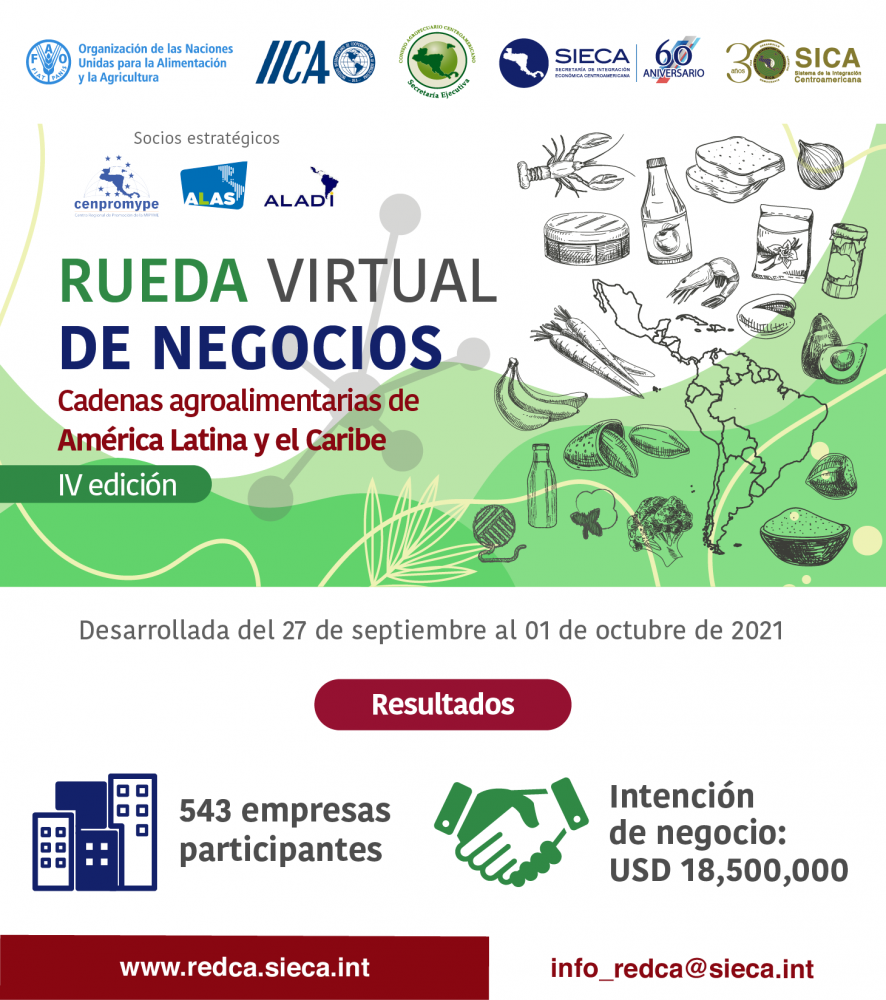Fourth virtual business roundtable of the agrifood chains of Latin America and the Caribbean resulted in trade deals valuing USD 18 million

San Jose, 13 October 2021 (IICA) – Five hundred forty-three companies—the vast majority from Latin America and the Caribbean—participated in a virtual business roundtable to promote trade relations and networks across the region’s agrifood chain and to consolidate and diversify export markets in the context of economic recovery.
The roundtable took place from 27 September to 1 October 2021 and resulted in trade deals valuing over USD 18 million.
Buyers and sellers from Argentina, Bolivia, Brazil, Chile, Colombia, Costa Rica, Cuba, Ecuador, El Salvador, Guatemala, Guyana, Honduras, Mexico, Nicaragua, Panama, Paraguay, Peru, Dominican Republic, Uruguay and Venezuela participated in the event, in addition to buyers from Spain and the United States.
The event was held using the platform of the Central American Trade Network (CATN) and was organized by the Secretariat for Central American Economic Integration (SIECA), the Inter-American Institute for Cooperation on Agriculture (IICA), FAO and the Executive Secretariat of the Central American Agricultural Council (SECAC) with the support of the Latin American Integration Association (ALADI), the Latin American Supermarket Association (ALAS) and the Regional Center for the Promotion of Micro, Small and Medium-sized Enterprises (CENROMYPE).
The initiative was aimed at promoting the trade of primary products and by-products, processed foods, natural cotton fibers, production support services and trade services.
The most represented subsectors included fruit and vegetables, coffee and cacao, basic grains and seeds, healthy packaged foods and snacks, packaging and distribution, transportation and logistics services.
Desiree García, Executive Director of SIECA, said that “the virtual business roundtable organized by IICA, FAO and SECAC opened the door for trade relations between companies in Latin America and the Caribbean. These activities promote trade and support post-COVID-19 recovery. We hope to continue offering these trade development activities so that more and more companies can join in and make contact with potential strategic partners, customers or suppliers through virtual meetings without incurring in mobility or representation costs”.
“In response to the pandemic, food companies have had to seek new trade channels and new ways of doing business virtually. These business roundtables have helped them to respond to this interruption”, affirmed Oswaldo Segura, Trade and Competitiveness Specialist at SECAC.
“Over 20 countries participated in this fourth edition, representing all the regions of Latin America and the Caribbean. Our hope is that this wide range of destinations will allow companies and producer organizations to consolidate and diversify their presence in regional markets, thereby contributing to food and nutrition security and accelerating the process of post-COVID-19 economic recovery in the region”, commented Daniel Rodríguez, Manager of IICA’s International Trade and Regional Integration Program.
“This is the fourth successful edition of the business roundtable for the agrifood chain and, without a doubt, we are cementing a regional public good by serving rural SMEs, cooperatives and family farming organizations and generating spaces and opportunities for insertion into new markets. We hope that these virtual spaces continue to grow to strengthen trade networks in the region and foster direct links between producers and buyers”, commented Pablo Rabczuk, Trade and Agrifood Systems Officer at FAO for Mesoamerica.
The business roundtables are a space for companies to make contact with potential strategic partners, customers or suppliers through virtual meetings scheduled by the participants from anywhere in the world using a cellular device or computer with an internet connection to drive the development of business networks in the agrifood sector in Latin America and the Caribbean and, with it, foster interregional trade in the context of COVID-19.
More information:
Institutional Communication Division
comunicacion.institucional@iica.int